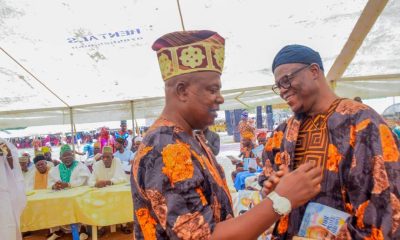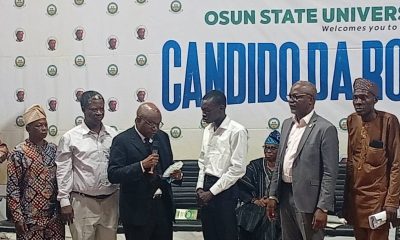News
THE ROLES OF LEADERS FOR EFFECTIVE ORGANIZATION: Full Lecture Delivered By Com Adeboye Adebayo At OPC Leadership Retreat
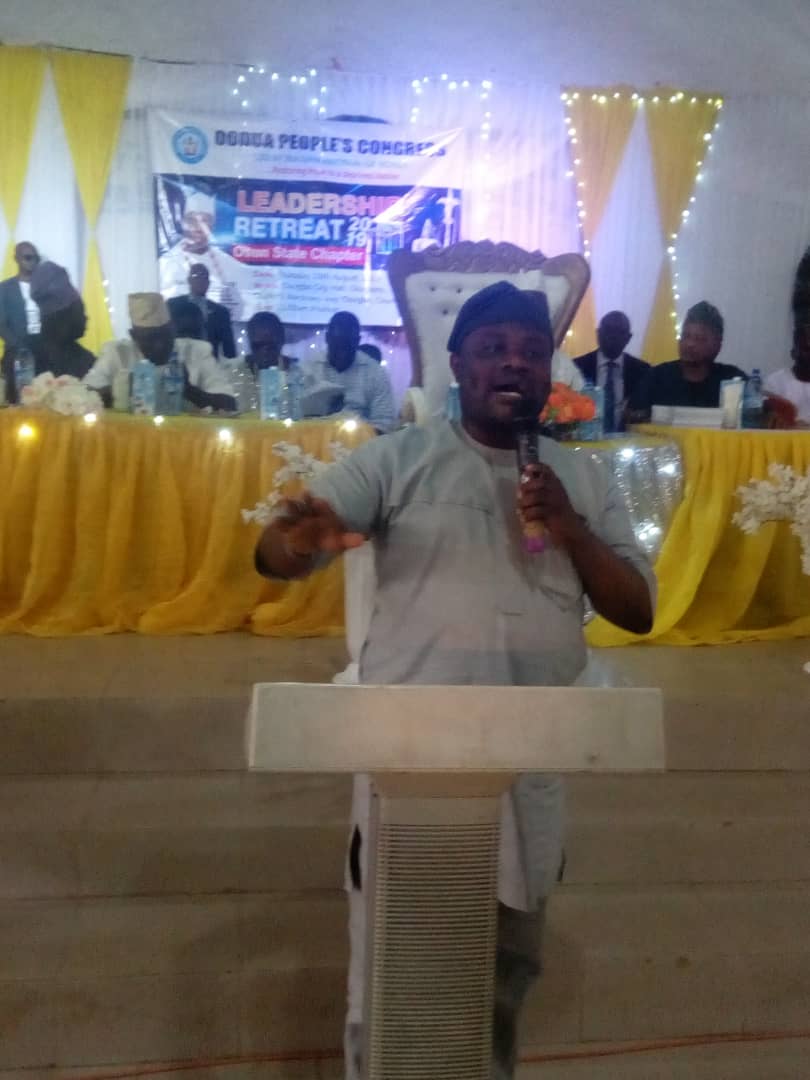
BEING A LECTURE DELIVERED BY COMRADE ADEBOYE ADEBAYO AT THE LEADERSHIP RETREAT 2019 ORGANISED BY THE OODUA PEOPLE’S CONGRESS; OPC IN OSOGBO, STATE OF OSUN, NIGERIA
*TOPIC: THE ROLES OF LEADERS FOR EFFECTIVE ORGANIZATION*
What is leadership? A simple definition is that leadership is the art of motivating a group of people to act towards achieving a common goal. In a business or organisational setting, this can mean directing workers and colleagues with a strategy to meet the organisation’s needs.
This leadership definition captures the essentials of being able to inspire others. Effective leadership is based on ideas (whether original or borrowed), but won’t happen unless those ideas can be communicated to others in a way that engages them enough to act as the leader wants them to act.
Put even more simply, the leader is the inspiration and director of the action. He or she is the person in the group that possesses the combination of personality and leadership skills that makes others want to follow his or her direction.
Organizational Leadership and the Bottom Line
In an organization, leadership is linked to performance and any leadership definition has to take that into account. While it’s not solely about financial rewards, those who are viewed as effective leaders are those who increase their organization’s bottom lines. If an individual in a leadership role does not meet expectations set by National Council or the aims &objectives, such leader must be removed because emotions or sentiment cannot work in an organization that is result-based.
Leadership requires traits that extend beyond management duties. To be effective, a leader certainly has to manage the resources at his or her disposal. But leadership also involves communicating, inspiring and supervising – just to name three more of the primary skills a leader has to have to be successful.
Leaders: Born or Made?
While there are people who seem to be naturally endowed with more leadership abilities than others, people can learn to become leaders by improving particular skills.
History is full of people who, while having no previous leadership experience, have stepped to the fore in crisis situations and persuaded others to follow their suggested course of action. They possessed traits and qualities that helped them to step into roles of leadership.
Writing in Forbes magazine, Erika Andersen, author of “Leading So People Will Follow,” says, like most things – leadership capability falls along a bell curve. So the fact is that most folks who start out with a modicum of innate leadership capability can actually become very good, even great leaders.
The Evolution of a Leader
Steve Jobs is a classic example of someone who was probably not born to be a leader. After starting Apple Computer from his garage in 1976 he was fired by the board of directors in 1985 when the company was under intense competition and he disagreed with the CEO on of the future direction of the business. After founding Pixar Animation Studios and NeXT Computer he was eventually rehired by Apple in 1997 as CEO and went on to develop the revolutionary iPod, iPhone, and many other products.
By all accounts, Steve Jobs was a very mercurial genius who early in his career routinely yelled at employees, co-workers, partners, and vendors. According to some ex-employees of Apple and NeXT, he was intolerant of anything he viewed as a failure and his foul-mouthed tirades were the stuff of legend. He apparently believed in being brutally honest with others and that their feelings were irrelevant. He did not conduct formal reviews with employees and was very sparing with praise for a job well done.
However, according to biographies, such as “Steve Jobs” by Walter Isaacson, as he matured his management style began to shift and he began to moderate some of his more negative traits and have more empathy for others, realizing that people had limits. Upon his return to Apple, he was forced to cut staff and was quoted as expressing concern for families of employees that were laid off.
Jobs died on October 5, 2011 at the age of 56. Even after his death, his reputation lives on. An October 2018 article in Forbes magazine stated, “Today precisely seven years after his [Jobs] passing his name is still synonymous with visionary, genius, innovator, and icon.”
Everybody defines leadership differently but I really like the way John C Maxwell defines leadership, “A leader is one who knows the way, goes the way, and shows the way.” Irrespective of how you define a leader, he or she can prove to be a difference maker between success and failure. A good leader has a futuristic vision and knows how to turn his ideas into real-world success stories. In this lecture, I take an in-depth look at some of the important leadership qualities that separate good leaders from a bad one as applicable to a self determination group like the formidable Oodua People’s Congress. Being a good leader isn’t easy. While a leader’s actions may be scrutinized when things are going bad, it is their leadership qualities that shine through the worst of times. It is these same qualities that followers look up to, respect, and work very hard for. This is why it is so important for every leader to work hard to gain the qualities of great leadership.
WHY WAS OODUA PEOPLE’S CONGRESS; OPC FORMED.
I will quote the leader of the congress himself; Aare Gani Adams on the reasons why the congress was formed.
According to him while addressing an international conference on “Urban Violence, Ethnic Militia and the Challenge of Democratic Consolidation of Nigeria.”
Adams said the group was formed not to destroy but to build, not to embarrass innocent people but to correct wrongdoings in the society.
OPC is not to encourage discord, “but to assuage it, not to build false hopes but to promote, defend and propagate the truth, justice and self determination.” He added that the group felt obliged to promote the total emancipation of Yoruba because, ‘because if the Yoruba people are not free to develop themselves in a democratic atmosphere and denied justice, Nigeria has little chance of surviving in the 21st century,”.
To achieve this aforementioned aims of the Congress by its overall boss, the leaders of the OPC must exhibit certain qualities that will make them hugely successful.
Here are few but gemane attributes of some of today’s truly great leaders.
1. Clarity.
They are clear and concise at all times–there is no question of their vision and what needs to be accomplished. This gives others the opportunity to digest their goals and decide whether or not they will support their cause. Generally, very few people know what they want, much less how to get there, so they will gravitate towards those who appear to have a clear picture in mind–good clarity leads to great achievement.
2. Honesty and Integrity.
The 34th President of United States, Dwight.D.Eisenhower once said, “The supreme quality of leadership is unquestionably integrity. Without it, no real success is possible, no matter whether it is on a section gang, a football field, in an army, or in an office.” Honesty and integrity are two important ingredients which make a good leader. How can you expect your followers to be honest when you lack these qualities yourself? Leaders succeed when they stick to their values and core beliefs and without ethics, this will not be possible.
3. Confidence.
To be an effective leader, you should be confident enough to ensure that other follow your commands. If you are unsure about your own decisions and qualities, then your subordinates will never follow you. As a leader, you have to be oozing with confidence, show some swagger and assertiveness to gain the respect of your subordinates. This does not mean that you should be overconfident, but you should at least reflect the degree of confidence required to ensure that your followers trust you as a leader.
4. Humility.
While confidence is a very attractive trait in leaders, there’s nothing like a humble character for creating a lovable persona. Great leaders admit when they are wrong and take criticism as an opportunity for growth. Show the world how grateful you are to be where you are. This, in turn, will demonstrate how much you deserve the leadership role.
5. Inspire Others.
Probably the most difficult job for a leader is to persuade others to follow. It can only be possible if you inspire your followers by setting a good example. When the going gets tough, they look up to you and see how you react to the situation. If you handle it well, they will follow you. As a leader, should think positive and this positive approach should be visible through your actions. Stay calm under pressure and keep the motivation level up. As John Quincy Adams puts it, “If your actions inspire others to dream more, learn more, do more and become more, you are a leader.” If you are successful in inspiring your subordinates, you can easily overcome any current and future challenge easily.
6. Commitment and Passion.
Your teams look up to you and if you want them to give them their all, you will have to be passionate about it too. When your teammates see you getting your hands dirty, they will also give their best shot. It will also help you to gain the respect of your subordinates and infuse new energy in your team members, which helps them to perform better. If they feel that you are not fully committed or lacks passion, then it would be an uphill task for the leader to motivate your followers to achieve the goal.
7. Good Communicator.
Good Communicator -Until you clearly communicate your vision to your team and tell them the strategy to achieve the goal, it will be very difficult for you to get the results you want. Simply put, if you are unable to communicate your message effectively to your team, you can never be a good leader. A good communicator can be a good leader. Words have the power to motivate people and make them do the unthinkable. If you use them effectively, you can also achieve better results.
8. Decision-Making Capabilities.
Apart from having a futuristic vision, a leader should have the ability to take the right decision at the right time. Decisions taken by leaders have a profound impact on masses. A leader should think long and hard before taking a decision but once the decision is taken, stand by it. Although, most leaders take decisions on their own, but it is highly recommended that you consult key stakeholders before taking a decision. After all, they are the ones who will benefit or suffer from your decisions.
9. Accountability.
When it comes to accountability, you need to follow the approach highlighted by Arnold H Glasow when he said, “A good leader takes little more than his share of the blame and little less than his share of the credit.” Make sure that every one of your subordinates is accountable for what they are doing. If they do well, give them a pat on the back but if they struggle, make them realize their mistakes and work together to improve. Holding them accountable for their actions will create a sense of responsibility among your subordinates and they will go about the business more seriously.
10. Delegation and Empowerment.
Delegation and Empowerment -You cannot do everything, right. It is important for a leader to focus on key responsibilities while leaving the rest to others. By that, I mean empowering your followers and delegating tasks to them. If you continue to micromanage your subordinates, it will develop a lack of trust and more importantly, you will not be able to focus on important matters, as you should be. Delegate tasks to your subordinates and see how they perform. Provide them with all the resources and support they need to achieve the objective and give them a chance to bear the responsibility.
11. Creativity and Innovation.
What separates a leader from a follower? Steve Jobs, the greatest visionary of our time answers this question this way, “Innovation distinguishes between a leader and a follower.” In order to get ahead in today’s fast-paced world, a leader must be creative and innovative at the same time. Creative thinking and constant innovation is what makes you and your team stand out from the crowd. Think out of the box to come up with unique ideas and turn those ideas and goals into reality.
12. Empathy
Last but certainly not the least, is empathy. Leaders should develop empathy with their followers. Unfortunately, most leaders follow a dictatorial style and neglect empathy altogether. Due to this, they fail to make a closer connection with their followers. Understanding the problems of your followers and feeling their pain is the first step to become an effective leader. Even that is not enough until you work hard and provide your followers with the suitable solution to their problems.
NEW CHALLENGES FOR THE CONGRESS
Before I conclude, I want to challenge the leadership of this Congress of Oodua People on the Security of the Southwest & Governance in general. OPC as a body should endeavour to take charge of the security of the region for its socioeconomic development. OPC should come with a workable strategies and planning for implementation to adequately secure the Yoruba Nation. Also I urge this Congress to be part of solution provider to National Problems, as we all know, the country as today is going various challenges in all facets of life and in all the sectors of the economy. OPC should be able to come out with plans and strategies that will proffer permanent solutions to all national problems.
PERCEPTION OF THE CONGRESS.
Another task I want to impore the leadership of this Congress to takeaway from this retreat for immediate attention is the perception, it is very key. As much as the intention is good and very germane for the Yoruba Nation, the perception of the people whose interest we want to protect through the tenets & principle of the congress, is not too good. The leadership of the congress as a takeaway of this retreat should device a means to change the negative perception of the people towards OPC through programs like this, workshops, educative seminars and media engagements among other things. By this, people will come to terms and reality and correct understanding of the intention, aims, objectives, principles and indeed mode of operation of the congress.
Conclusion
To become a good leader, you must have all these qualities but if you lack some of these qualities, then you might struggle to make the mark in the world of leadership. You will have to set a good example for others to follow. That is where your commitment, passion, empathy, honesty and integrity come into play. Good communication skills and decision-making capabilities also play a vital role in success and failure of a leader. Lastly, innovation and creative thinking, as well as the futuristic vision, are a couple of key traits which make a leader stand out.
I thank you all for your rapt attention.
God bless the OPC!
God bless Yoruba Nation!!
God bless the Federal Republic of Nigeria!!!
*Comrade Adeboye Adebayo is a Chieftain of the All Progressives Congress, APC, Local Government Chairmanship Aspirant at Orile Agege LCDA, Lagos, Leader & Member of many Socio-Political & Youth Groups, and a Development Expert in Media, Research, Strategy & Governance; MRS-G.**BEING A LECTURE DELIVERED BY COMRADE ADEBOYE ADEBAYO AT THE LEADERSHIP RETREAT 2019 ORGANISED BY THE OODUA PEOPLE’S CONGRESS; OPC IN OSOGBO, STATE OF OSUN, NIGERIA.*
*TOPIC: THE ROLES OF LEADERS FOR EFFECTIVE ORGANIZATION*
What is leadership? A simple definition is that leadership is the art of motivating a group of people to act towards achieving a common goal. In a business or organisational setting, this can mean directing workers and colleagues with a strategy to meet the organisation’s needs.
This leadership definition captures the essentials of being able to inspire others. Effective leadership is based on ideas (whether original or borrowed), but won’t happen unless those ideas can be communicated to others in a way that engages them enough to act as the leader wants them to act.
Put even more simply, the leader is the inspiration and director of the action. He or she is the person in the group that possesses the combination of personality and leadership skills that makes others want to follow his or her direction.
Organizational Leadership and the Bottom Line
In an organization, leadership is linked to performance and any leadership definition has to take that into account. While it’s not solely about financial rewards, those who are viewed as effective leaders are those who increase their organization’s bottom lines. If an individual in a leadership role does not meet expectations set by National Council or the aims &objectives, such leader must be removed because emotions or sentiment cannot work in an organization that is result-based.
Leadership requires traits that extend beyond management duties. To be effective, a leader certainly has to manage the resources at his or her disposal. But leadership also involves communicating, inspiring and supervising – just to name three more of the primary skills a leader has to have to be successful.
Leaders: Born or Made?
While there are people who seem to be naturally endowed with more leadership abilities than others, people can learn to become leaders by improving particular skills.
History is full of people who, while having no previous leadership experience, have stepped to the fore in crisis situations and persuaded others to follow their suggested course of action. They possessed traits and qualities that helped them to step into roles of leadership.
Writing in Forbes magazine, Erika Andersen, author of “Leading So People Will Follow,” says, like most things – leadership capability falls along a bell curve. So the fact is that most folks who start out with a modicum of innate leadership capability can actually become very good, even great leaders.
The Evolution of a Leader
Steve Jobs is a classic example of someone who was probably not born to be a leader. After starting Apple Computer from his garage in 1976 he was fired by the board of directors in 1985 when the company was under intense competition and he disagreed with the CEO on of the future direction of the business. After founding Pixar Animation Studios and NeXT Computer he was eventually rehired by Apple in 1997 as CEO and went on to develop the revolutionary iPod, iPhone, and many other products.
By all accounts, Steve Jobs was a very mercurial genius who early in his career routinely yelled at employees, co-workers, partners, and vendors. According to some ex-employees of Apple and NeXT, he was intolerant of anything he viewed as a failure and his foul-mouthed tirades were the stuff of legend. He apparently believed in being brutally honest with others and that their feelings were irrelevant. He did not conduct formal reviews with employees and was very sparing with praise for a job well done.
However, according to biographies, such as “Steve Jobs” by Walter Isaacson, as he matured his management style began to shift and he began to moderate some of his more negative traits and have more empathy for others, realizing that people had limits. Upon his return to Apple, he was forced to cut staff and was quoted as expressing concern for families of employees that were laid off.
Jobs died on October 5, 2011 at the age of 56. Even after his death, his reputation lives on. An October 2018 article in Forbes magazine stated, “Today precisely seven years after his [Jobs] passing his name is still synonymous with visionary, genius, innovator, and icon.”
Everybody defines leadership differently but I really like the way John C Maxwell defines leadership, “A leader is one who knows the way, goes the way, and shows the way.” Irrespective of how you define a leader, he or she can prove to be a difference maker between success and failure. A good leader has a futuristic vision and knows how to turn his ideas into real-world success stories. In this lecture, I take an in-depth look at some of the important leadership qualities that separate good leaders from a bad one as applicable to a self determination group like the formidable Oodua People’s Congress. Being a good leader isn’t easy. While a leader’s actions may be scrutinized when things are going bad, it is their leadership qualities that shine through the worst of times. It is these same qualities that followers look up to, respect, and work very hard for. This is why it is so important for every leader to work hard to gain the qualities of great leadership.
WHY WAS OODUA PEOPLE’S CONGRESS; OPC FORMED.
I will quote the leader of the congress himself; Aare Gani Adams on the reasons why the congress was formed.
According to him while addressing an international conference on “Urban Violence, Ethnic Militia and the Challenge of Democratic Consolidation of Nigeria.”
Adams said the group was formed not to destroy but to build, not to embarrass innocent people but to correct wrongdoings in the society.
OPC is not to encourage discord, “but to assuage it, not to build false hopes but to promote, defend and propagate the truth, justice and self determination.” He added that the group felt obliged to promote the total emancipation of Yoruba because, ‘because if the Yoruba people are not free to develop themselves in a democratic atmosphere and denied justice, Nigeria has little chance of surviving in the 21st century,”.
To achieve this aforementioned aims of the Congress by its overall boss, the leaders of the OPC must exhibit certain qualities that will make them hugely successful.
Here are few but gemane attributes of some of today’s truly great leaders.
1. Clarity.
They are clear and concise at all times–there is no question of their vision and what needs to be accomplished. This gives others the opportunity to digest their goals and decide whether or not they will support their cause. Generally, very few people know what they want, much less how to get there, so they will gravitate towards those who appear to have a clear picture in mind–good clarity leads to great achievement.
2. Honesty and Integrity.
The 34th President of United States, Dwight.D.Eisenhower once said, “The supreme quality of leadership is unquestionably integrity. Without it, no real success is possible, no matter whether it is on a section gang, a football field, in an army, or in an office.” Honesty and integrity are two important ingredients which make a good leader. How can you expect your followers to be honest when you lack these qualities yourself? Leaders succeed when they stick to their values and core beliefs and without ethics, this will not be possible.
3. Confidence.
To be an effective leader, you should be confident enough to ensure that other follow your commands. If you are unsure about your own decisions and qualities, then your subordinates will never follow you. As a leader, you have to be oozing with confidence, show some swagger and assertiveness to gain the respect of your subordinates. This does not mean that you should be overconfident, but you should at least reflect the degree of confidence required to ensure that your followers trust you as a leader.
4. Humility.
While confidence is a very attractive trait in leaders, there’s nothing like a humble character for creating a lovable persona. Great leaders admit when they are wrong and take criticism as an opportunity for growth. Show the world how grateful you are to be where you are. This, in turn, will demonstrate how much you deserve the leadership role.
5. Inspire Others.
Probably the most difficult job for a leader is to persuade others to follow. It can only be possible if you inspire your followers by setting a good example. When the going gets tough, they look up to you and see how you react to the situation. If you handle it well, they will follow you. As a leader, should think positive and this positive approach should be visible through your actions. Stay calm under pressure and keep the motivation level up. As John Quincy Adams puts it, “If your actions inspire others to dream more, learn more, do more and become more, you are a leader.” If you are successful in inspiring your subordinates, you can easily overcome any current and future challenge easily.
6. Commitment and Passion.
Your teams look up to you and if you want them to give them their all, you will have to be passionate about it too. When your teammates see you getting your hands dirty, they will also give their best shot. It will also help you to gain the respect of your subordinates and infuse new energy in your team members, which helps them to perform better. If they feel that you are not fully committed or lacks passion, then it would be an uphill task for the leader to motivate your followers to achieve the goal.
7. Good Communicator.
Good Communicator -Until you clearly communicate your vision to your team and tell them the strategy to achieve the goal, it will be very difficult for you to get the results you want. Simply put, if you are unable to communicate your message effectively to your team, you can never be a good leader. A good communicator can be a good leader. Words have the power to motivate people and make them do the unthinkable. If you use them effectively, you can also achieve better results.
8. Decision-Making Capabilities.
Apart from having a futuristic vision, a leader should have the ability to take the right decision at the right time. Decisions taken by leaders have a profound impact on masses. A leader should think long and hard before taking a decision but once the decision is taken, stand by it. Although, most leaders take decisions on their own, but it is highly recommended that you consult key stakeholders before taking a decision. After all, they are the ones who will benefit or suffer from your decisions.
9. Accountability.
When it comes to accountability, you need to follow the approach highlighted by Arnold H Glasow when he said, “A good leader takes little more than his share of the blame and little less than his share of the credit.” Make sure that every one of your subordinates is accountable for what they are doing. If they do well, give them a pat on the back but if they struggle, make them realize their mistakes and work together to improve. Holding them accountable for their actions will create a sense of responsibility among your subordinates and they will go about the business more seriously.
10. Delegation and Empowerment.
Delegation and Empowerment -You cannot do everything, right. It is important for a leader to focus on key responsibilities while leaving the rest to others. By that, I mean empowering your followers and delegating tasks to them. If you continue to micromanage your subordinates, it will develop a lack of trust and more importantly, you will not be able to focus on important matters, as you should be. Delegate tasks to your subordinates and see how they perform. Provide them with all the resources and support they need to achieve the objective and give them a chance to bear the responsibility.
11. Creativity and Innovation.
What separates a leader from a follower? Steve Jobs, the greatest visionary of our time answers this question this way, “Innovation distinguishes between a leader and a follower.” In order to get ahead in today’s fast-paced world, a leader must be creative and innovative at the same time. Creative thinking and constant innovation is what makes you and your team stand out from the crowd. Think out of the box to come up with unique ideas and turn those ideas and goals into reality.
12. Empathy
Last but certainly not the least, is empathy. Leaders should develop empathy with their followers. Unfortunately, most leaders follow a dictatorial style and neglect empathy altogether. Due to this, they fail to make a closer connection with their followers. Understanding the problems of your followers and feeling their pain is the first step to become an effective leader. Even that is not enough until you work hard and provide your followers with the suitable solution to their problems.
NEW CHALLENGES FOR THE CONGRESS
Before I conclude, I want to challenge the leadership of this Congress of Oodua People on the Security of the Southwest & Governance in general. OPC as a body should endeavour to take charge of the security of the region for its socioeconomic development. OPC should come with a workable strategies and planning for implementation to adequately secure the Yoruba Nation. Also I urge this Congress to be part of solution provider to National Problems, as we all know, the country as today is going various challenges in all facets of life and in all the sectors of the economy. OPC should be able to come out with plans and strategies that will proffer permanent solutions to all national problems.
PERCEPTION OF THE CONGRESS.
Another task I want to impore the leadership of this Congress to takeaway from this retreat for immediate attention is the perception, it is very key. As much as the intention is good and very germane for the Yoruba Nation, the perception of the people whose interest we want to protect through the tenets & principle of the congress, is not too good. The leadership of the congress as a takeaway of this retreat should device a means to change the negative perception of the people towards OPC through programs like this, workshops, educative seminars and media engagements among other things. By this, people will come to terms and reality and correct understanding of the intention, aims, objectives, principles and indeed mode of operation of the congress.
Conclusion
To become a good leader, you must have all these qualities but if you lack some of these qualities, then you might struggle to make the mark in the world of leadership. You will have to set a good example for others to follow. That is where your commitment, passion, empathy, honesty and integrity come into play. Good communication skills and decision-making capabilities also play a vital role in success and failure of a leader. Lastly, innovation and creative thinking, as well as the futuristic vision, are a couple of key traits which make a leader stand out.
I thank you all for your rapt attention.
God bless the OPC!
God bless Yoruba Nation!!
God bless the Federal Republic of Nigeria!!!
*Comrade Adeboye Adebayo is a Chieftain of the All Progressives Congress, APC, Local Government Chairmanship Aspirant at Orile Agege LCDA, Lagos, Leader & Member of many Socio-Political & Youth Groups, and a Development Expert in Media, Research, Strategy & Governance; MRS-G.*
-
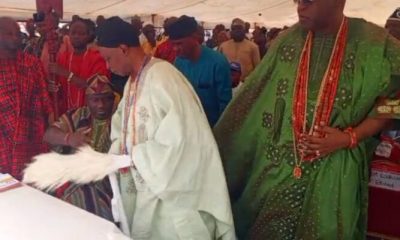
 News2 days ago
News2 days agoAlaafin Must Respect Olubadan Stool or Face Consequences – Ibadan Traditional Leaders
-
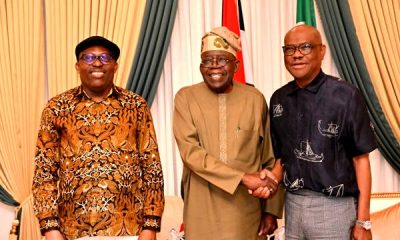
 News5 days ago
News5 days agoAgain, Tinubu Wades Into Wike-Fubara Feud
-

 News4 days ago
News4 days agoOsun 2026: ZLP Governorship Candidate Promises Accountability, Good Governance
-

 News4 days ago
News4 days agoResearchers Harp On Govt Policies To Safeguard Older People In Nigeria







